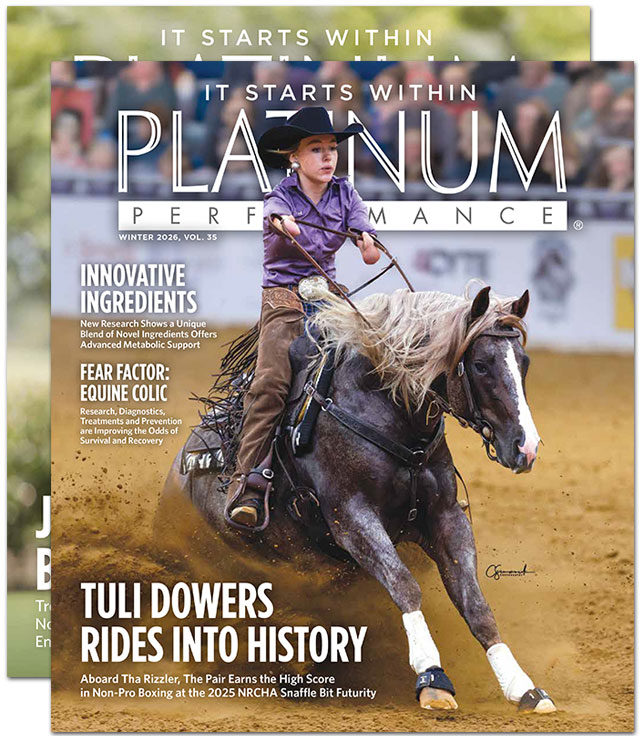Ingredients Supporting Quiet Behavior to Relax, Focus or Take The Edge Off During a Stressful Experience
Calming supplements for horses are increasingly popular and may offer support in a variety of behavioral situations. When deciding if a calming supplement is right for your horse, it may be most important to know your individual animal, and to be able to differentiate what is normal — or not. There are many factors at play when trying to support relaxed equine behavior, and a significant one to consider is the horse’s basic personality. Some horses are more spirited or sensitive than others, and a calming supplement will not take the place of good and patient horsemanship or the hours put into well-rounded training that result in a behaved and responsive attitude.
However, there are certainly instances when extra support may be needed to prevent injury or to help a horse relax, focus and take the edge off that does not interfere with motor coordination as some pharmaceutical drugs do. Calming formulas are most often used in situations when a horse is exposed to external stress that can occur in many forms. It can be stressful to bring a horse to an unfamiliar environment, such as arriving at a new barn or going to a horse show. A horse may get upset when dealing with certain phobias, like a visit from the farrier, clipping or hauling in the trailer. Stall rest can be stressful, and calming formulas can help an active horse adjust to confined time off while rehabilitating an injury. As prey animals, sensitive horses can be easily startled by touch or sound and calming ingredients may help to acclimate them, as well as to help moderate an aggressive temperament.
How Do Equine Calming Supplements Work?
Most ingredients in calming supplements have some effect on the nervous system, including the brain. The nervous system is made up of billions of nerve cells called neurons. Each cellular building block is connected to other neurons that form the electrical and chemical network of the nervous system. Neurons are specialized to send information throughout the body. Neurons take input from any of the five senses and relay it to the brain via electrical impulses sent from neuron to neuron. This cascade of information triggers the release of neurotransmitters. Neurotransmitters are chemical messengers in the body that transmit signals from nerve cells to target cells which may be in the muscles, glands or other neurons. They are able to activate or inhibit receptors on adjacent neurons to communicate. There are over 100 known neurotransmitters, but the focal three often related to calming are gamma aminobutyric acid (GABA), serotonin and dopamine.
• GABA is an amino acid and a primary neurotransmitter that helps to produce feelings of calm and self-control by regulating brain excitability and inhibiting excessive firing of neurons.
• Serotonin is a key hormone associated with feelings of well-being and happiness as well as lower levels of fear, stress, anxiety and aggression in humans and some animal species. Tryptophan is a precursor for serotonin.
• Dopamine is sometimes called the “feel good” neurotransmitter, as it is associated with thought, pleasurable feelings and focus. There is also evidence that dopamine plays a critical role in anxiety modulation in multiple parts of the brain.
Are Calming Supplements Legal During Competition?
Although calming supplements may not contain forbidden substances for horses in competition, it is still strongly recommended that products that may calm or relax a horse are discontinued seven days prior to competition. Calming formulas that contain natural or plant-based ingredients can have naturally-occurring substances that may or may not result in a positive drug test; it is important to remember that “natural” does not necessarily mean legal. Trainers and riders should also be advised that using calming products not explicitly banned by governing bodies, such as USEF or FEI, are not automatically compliant either. These associations mention a global prohibition of supplements and drugs intended to alter behavior, such as quieting a horse to enhance behavior during competition, because it violates the ethics, spirit and intent of the rules.
Peace and Quiet — From the Diet
Calming supplements can certainly offer support to many horses that may require the occasional “hand holding.” Keep in mind also that the horse’s daily diet can promote calm behavior. Allow horses as much turnout time as possible. Like equine recess, this gives them a chance to graze and the freedom to act like a horse that can be a helpful tool in promoting calm behavior. A forage-based diet consisting primarily, or even entirely, of pasture or grass hays, and consistently having it available is beneficial for anxious or stressed horses. Cutting down or eliminating heavy grains or concentrate feeds can have a positive influence on behavior and calmness. If more calories are needed to support activity or maintain body condition, use an unmolassed beet pulp or a beet pulp-based feed, or use healthy oils high in omega-3 fatty acids to provide calories instead of grain.
Balance the diet and correct vitamin and mineral imbalances. Either deficiencies or excesses have the potential to cause many health issues, including behavioral. Calcium, magnesium and B vitamin imbalances can affect nervous system function. Herbs and common botanicals may be capable of supporting focus and relaxation when used appropriately. Supplementing ingredients that support calmness can help to manage stress and may help horses maintain a relaxed disposition.


Ingredients that Support a Calm Mindset
Magnesium - Magnesium (Mg) is a macromineral significantly involved in both the nervous and muscular systems of the body. Because of its multipurpose effectiveness, orally supplemented magnesium is often a “first line of defense” calming ingredient to support neuromuscular and behavioral sensitivities and has been used anecdotally in calming supplements for years. Magnesium supplementation for edgy horses may provide noticeable benefits regarding spookiness and overreaction to sound, movement or touch. For these anxious or excitable horses, many respond to filling in simple nutritional gaps with basic, essential nutrients like magnesium. Horses that respond favorably to supplementation were possibly deficient in magnesium, and, once receiving optimal levels, are able to have normal muscular and neurological functioning that may be exhibited as a calmer attitude. Typical supplemental recommendations for an average 1,100-pound horse range from 2 to 10 grams per day.
As magnesium is heavily involved in the nervous system, low body levels may result in nerve excitability and hypersensitivity. Magnesium helps to calm the nervous system by stabilizing the membranes of nerve cells and regulating minerals involved in nerve transmissions. It promotes the production of serotonin, a major mood hormone as sociated with feelings of well-being. Magnesium helps brain relaxation as it supports the natural production of GABA that calms the nervous system. Magnesium supplementation in humans is documented to have calming effects on a variety of brain-receptor types. It is often used as part of a holistic approach to behavior and stress.
Calcium - Calcium (Ca) and magnesium work together in many bodily functions. Horses receiving excessive calcium in their diets can develop magnesium deficiency symptoms, likely caused by elevated calcium levels competing for or blocking magnesium absorption. Interestingly, excess magnesium can cause similar issues as it inhibits calcium and too little calcium can cause nervousness. However, deficiencies of Mg are far more common than deficiencies of calcium and Mg blood levels are less regulated than calcium. As is the case for all minerals, balance is key. Ideal dietary calcium to magnesium ratio is about 2:1. Most typical equine diets will be around this range. The ratio may be slightly higher or lower, but it is important that magnesium does not exceed calcium and calcium does not far exceed magnesium.
Horses showing symptoms of muscular problems, hypersensitivity or irritability on diets that may have adequate total magnesium but excessive amounts of calcium may be candidates for magnesium supplementation to help balance the ratio. For horses that are on an alfalfa hay or mixed grass/alfalfa hay diet and experiencing muscle problems or irritability, magnesium supplementation may help to relax tense, tight muscles.
B Vitamins - There are eight total B vitamins in the B-vitamin complex that in large part work interconnected with each other. The B-vitamin complex is involved in virtually every cell and organ system within the body. The nervous system, including the brain, relies on B vitamins. In fact, B vitamins with calcium is a common veterinary combination used intravenously to relax horses. Vitamins B1 (thiamin), vitamin B6 (pyridoxine) and vitamin B12 (cobalamin) are referred to as neurotropic B vitamins as they work together to promote nervous system health. In humans, many neurological conditions are linked to these vitamin deficiencies.
Thiamin is involved in numerous body functions including carbohydrate metabolism, which provides energy for the body, especially the brain and nervous system. Glucose is the main energy supply for nerve fibers. In neurons, thiamin “feeds” the cells by facilitating the use of carbohydrates for energy production. It has antioxidant properties and protects nerves from oxidative stress, constantly protecting nerves from damaging environmental influences and reducing hyperexcitability. Research is pointing to the fact that thiamin may also play a pivotal role in the process of nerve regeneration.
Thiamin aids in transmitting nerve impulses by supporting the flow of electrolytes in and out of muscle and nerve cells. As suggested, it also plays a role in muscle contraction. Horses deficient in thiamin often appear stressed and nervous, and supplementing thiamin into the diet may support positive behavioral changes. Interestingly in human reports, irritability and aggressive behaviors have been noted in thiamin deficiency cases. This may be due to the role that thiamin has on production and maintaining the integrity of neurotransmitters, such as dopamine and serotonin.
At higher levels, thiamin is sometimes used as calming support for nervous or agitated horses. Relatively large doses of 1 mg per pound of body weight per day have been seen anecdotally to add support for depression, anxiety and nervousness of horses. Oral toxicity has not been reported in horses and natural deficiencies are rare. The abundant microflora of the cecum and colon in the hindgut manufactures thiamin. Fresh grass, brans, yeasts, like Brewer’s yeast, and some wheat products also offer high dietary concentrations of vitamin B1. Horses on a normal diet have not been reported to have deficiency symptoms, although suboptimal levels of thiamin may produce symptoms of nervousness, irritability, excitability or muscle cramping. The Nutrient Requirements of Horses (per the NRC) suggests that daily diets of nonworking horses contain at least 3 mg of thiamin per kg of dry matter, and that the diets of working horses contain 5 mg per kg (30 mg for adult horses, 50 mg for performance horses). Supplementation may be suggested for heavily exercised horses or during antibiotic use and high-stress situations (that is, illness, infection, surgery, travel or old age). Due to its water solubility, the toxicity level is very low as excess levels will be efficiently filtered out by the kidneys and excreted.
Vitamin B6 (pyridoxine) is required by the central nervous system and helps to synthesize neurotransmitters, such as GABA, serotonin and dopamine, all critical for signal transmission in the nervous system. It inhibits the release of neurotoxic glutamate and restores sensory nerve function. A deficiency of pyridoxine in human cases reported symptoms of nervousness, irritability and depression. Supplemental pyridoxine has historically been used to help support depression and anxiety in human patients. The hindgut microbes synthesize pyridoxine. Dietary sources include fresh grass, seeds and brans. Dietary requirements are still unknown, but deficiencies and toxicities have never been reported in horses, making it likely that horses with a healthy cecum, the large equine fermentation vat that is part of the large intestine, on healthy diets are provided with adequate levels.
Vitamin B12 is crucial for normal nerve functioning and the central nervous system as it maintains myelin, the protective sheath that surrounds nerves. Without adequate myelin, nerves cannot communicate with each other properly and can lead to neurological damage. Even a mild deficiency of vitamin B12 may affect the nervous system and proper brain functioning. The only B vitamin that is not present in natural forages (the only non-animal dietary sources are milk and whey), vitamin B12 is readily produced by the gastrointestinal microflora. Cobalt, a trace mineral, is required by these microbes to synthesize vitamin B12. Neither deficiencies nor toxicities of vitamin B12 have been reported in horses, and there is currently no specific dietary requirement above what is supplied by the intestinal tract.

Did You Know?
Calming formulas are most often used in situations when a horse is exposed to external stress that can occur in many forms. It can be stressful to bring a horse to an unfamiliar environment, such as arriving at a new barn or going to a horse show. A horse may get upset when dealing with certain phobias, like a visit from the farrier, clipping or hauling in the trailer. Stall rest can be stressful, and calming formulas can help an active horse adjust to confined time off while rehabilitating an injury.
PHOTO BY ELIZABETH HAY PHOTOGRAPHY
Keep Calm and Use Probiotics
A healthy equine hindgut will likely provide adequate amounts of the B vitamins to support normal nervous system function. As the hindgut microflora is a major contributor of all the B vitamins, preserving the health of the digestive tract is crucial for proper synthesis of them. Illness, stress, antibiotic use and a high-starch diet can compromise the delicate microbe population and thus impair the B vitamin status. Providing a daily source of preand probiotics can help to support the health of the hindgut microflora and ensure that adequate B vitamins are available to the horse.
L-theanine - L-theanine is a unique extract from green tea used by the brain to promote neurotransmitter production. This neurologically active amino acid has been historically reported as a calming agent as it promotes relaxation and focus and may help support a strong immunity.
Green tea provides a calming effect that may seem contradictory to the stimulatory property of the tea's caffeine content. L-theanine is the reason for this paradox as it readily crosses the blood-brain barrier and acts antagonistically against the stimulatory effects of caffeine on the nervous system. Human research has shown L-theanine to create a sense of relaxation in as little as 30 minutes and peaking approximately five hours after ingestion. L-theanine is water soluble and considered very safe with studies showing repeated, high doses of L-theanine causing no harmful psychological or physical effects.
L-theanine’s neurological effects come via two fascinating pathways. The first involves brain waves, which are weak electrical impulses that can be measured on the head’s surface via an electroencephalogram (EEG). These brain waves are classified into four categories: alpha, beta, delta and theta. Each wave, characterized by a unique amplitude and frequency, is associated with a certain type of brain activity or mental state. Specifically, alpha waves are generated during a relaxed and effortlessly alert state. Alpha waves are used as an index of relaxation. L-theanine promotes the production of alpha brain waves and promotes an “alpha wave state” that results in an unusual combination of deep relaxation and mental alertness similar to what is achieved through meditation.
The second neurological pathway by L-theanine involves cellular glutamate activation and an increase in brain GABA and glycine levels. GABA and glycine, both neuroinhibitors, activate their respective receptors and instigate the production of serotonin and dopamine, compounds essential for relaxation. This response downregulates norepinephrine and cortisol, which directly affects mood.
Magnolia officinalis - Magnolia officinalis (Magnolia tree bark extract) has been commonly used for centuries by Chinese, Japanese and Korean populations as a means for promoting relaxation, as well as a variety of other health benefits. While the bark, leaves and flower of the magnolia tree can be used therapeutically, the bark specifically contains two well-studied bioactive compounds: honokiol and magnolol. In vitro studies suggest that these phenolic compounds exhibit neurotrophic activities. For example, they enhance the activity of the major mood neurotransmitters — GABA and serotonin — to produce a calming effect in subjects. Studies suggest that this medicinal plant extract suppresses cortisol, a stress marker, and inhibits both adrenaline, a hormone-supporting alertness and corticosterone. Another significant health benefit of Magnolia officinalis includes its antioxidant activity, which moderates oxidative stress in the brain and throughout the body.
Phellodendron amurense - Phellodendron amurense (Phellodendron tree bark extract) is another botanical used for centuries to address a variety of health concerns. Combined with Magnolia officinalis, it exists as a commercially-available supplement (Relora®) to moderate stress and anxiety, as well as to improve sleep. The active ingredient, berberine, in combination with honokiol from Magnolia bark supports a calming state. Recent human studies report this combination may help subjects cope with external stressors and promote relaxation.

by Emily Smith, MS,
Platinum Performance®

